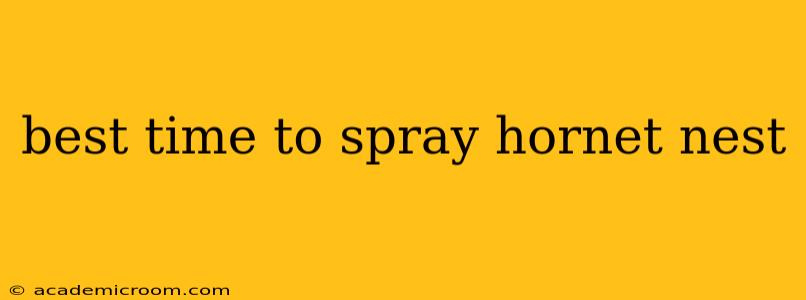Hornet nests can be a serious threat, especially if you or your family members have allergies to their stings. Knowing the best time to spray a hornet nest significantly increases the chances of success and minimizes your risk. This guide will walk you through the optimal time for treatment, safety precautions, and what to do after you've sprayed the nest.
What is the best time of day to spray a hornet nest?
The absolute best time to spray a hornet nest is during the early evening or late at night. This is because hornets are significantly less active at these times. They're typically less active and have mostly returned to the nest for the night, reducing the likelihood of aggressive encounters. The cooler temperatures also slow down their movement.
What is the safest time of year to remove a hornet nest?
The ideal time of year to remove a hornet nest is typically in the late fall or early winter. By this time, most hornet colonies have died off or significantly diminished in size, leaving few hornets to pose a threat. This is the safest and most effective approach.
What time of day is best for hornet nest removal?
As mentioned above, early evening or late at night remains the safest time of day, even if removing the nest yourself isn't recommended (see below). The reduced hornet activity dramatically improves the safety of any intervention.
How do I get rid of a hornet nest safely?
Do not attempt to remove a hornet nest yourself unless you have extensive experience with pest control and appropriate protective gear. Hornet stings can be painful and dangerous, particularly for those with allergies. A hornet nest represents a colony of potentially hundreds of stinging insects, which are capable of delivering a potentially lethal amount of venom in a combined attack.
Instead, contact a professional pest control service. They have the expertise, equipment, and protective gear to handle hornet nests safely and effectively. They know how to approach and treat the nest to minimize your risk and ensure complete elimination.
Is it safe to spray a hornet nest during the day?
While not ideal, it's possible to spray a hornet nest during the day. However, you significantly increase the risk of stings. If you must spray during the day, choose a time when activity is lowest, such as a cool, overcast day or immediately after a rainfall (while hornets are less active). Again, professional help is strongly recommended.
What if hornets are attacking me while I'm spraying the nest?
This is a situation you want to avoid at all costs. If hornets start attacking while you're attempting to spray the nest, immediately retreat to a safe location. Run away and seek shelter. Do not try to fight back. If you've been stung multiple times, seek immediate medical attention.
What should I do after spraying the hornet nest?
After spraying the nest, leave the area immediately and do not approach the nest again. The insecticide needs time to work, and the hornets may still be somewhat active, even after treatment. Follow the instructions on the insecticide product label regarding how long to stay away from the treated area. Monitor the nest for any remaining activity, and contact the pest control service if the nest isn't completely eliminated.
This guide provides a comprehensive approach to dealing with hornet nests, emphasizing safety and professional help. Remember, your health and safety are paramount. Do not risk your well-being by attempting to handle this on your own. Call in the professionals for the most efficient and safe removal.
